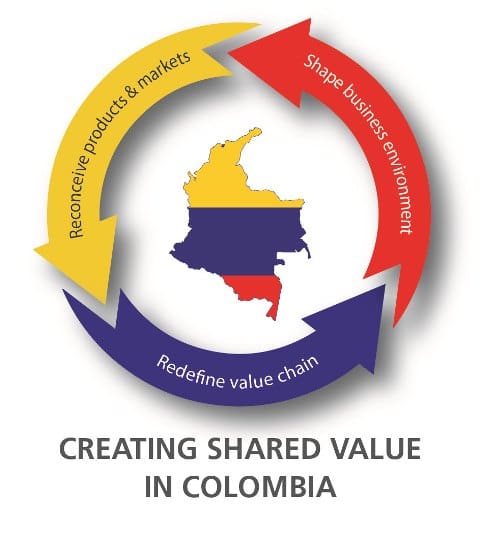The Empresas INspiradoras list recognizes companies operating in Colombia that are adopting a shared value approach. FSG worked closely with Colombian National Industry Association (ANDI) to develop a set of selection criteria that were appropriate for Colombia’s business and socio-political context. These included: the scale of measurable social impact of a shared value strategy, its contribution to the company’s profitability and competitive advantage, and the degree to which the strategy supports the inclusion of historically underserved or marginalized groups.
The Empresas INspiradoras list highlights 24 companies, the CEOs of which were recognized during the Congreso Empresarial Colombiano 2018, Colombia’s most important private sector convening. FSG’s Mark Kramer and Laura Amaya gave a keynote speech as part of the launch. What follows is an excerpt from an article that Dane Smith and Laura Amaya wrote in the Empresas INspiradoras special issue for Portafolio financial magazine.
Colombia remains among the most unequal countries in the world, more unequal than others like India or Nigeria. Recent economic growth has not been inclusive, and many Colombians have not benefitted from the country’s progress. The private sector, by and large, sees social problems as the government’s responsibility. When companies get involved in social problems, they generally confine themselves to complying with legal requirements, paying taxes, and funding philanthropic initiatives that improve their public image.
The private sector has begun to feel the consequences of this approach. Edelman’s Trust Barometer reveals that trust in the private sector has dropped over the last few years in Colombia. This lack of trust manifests itself in community unrest, such as when the people of Cajamarca, Quindío revoked the license to operate of a pre-approved mining project for fear of environmental impacts. It also shows in calls for increased regulation, as the proposed tax on soft drinks, in response to rising obesity levels and unethical advertising by companies. Increasingly, both civil society and the government want companies to not only operate responsibly but also to take a proactive role in shaping Colombia’s development.
In the midst of this dynamic, a small number of companies have begun to discover that they can improve their bottom line by actively involving themselves in helping to solve social problems. These companies are finding business opportunities in confronting the social and environmental challenges around them; they are taking a shared value approach.
In Colombia, shared value can help redefine the role of the private sector in society, allowing companies to improve their increasingly challenged legitimacy. Companies can leverage shared value in three primary ways to increase their returns by solving social and environmental problems:
- First, companies can reconceive products and markets. Promigas (a utility company) created Brilla, a new business unit that provides credit to unbanked groups, using the payment history of their utility customers to determine individual credit limits. In 2017 they lent over $150 million in nearly 450,000 transactions, an average of around $345 per loan, equivalent to $1 million Colombian pesos.
- Second, companies can redefine the productivity of their value chain. Constructora Bolívar (a real estate giant) has trained over 1,400 low-income people in building administration, responding to increased levels of conflict in its affordable housing projects. This new cohort of administrators has a monthly income that they previously lacked and now contribute to fostering safer, more cohesive communities in Constructora Bolívar’s projects. As a result, 10% of the company’s new customers come from new homeowner referrals.
- Finally, companies can shape the enabling environment for their business. Alquería has strengthened smallholder milk farmers in regions affected by Colombia’s armed conflict, from whom it purchases high-quality milk that ensures the best products for its customers. Alquería has thus secured the continuous supply of high-quality milk across different geographies, becoming the main UHT milk processor in the Andean region.
When companies feel that existing markets are saturated or not growing fast enough, shared value can help identify new market opportunities. When companies feel that costs are rising, shared value can identify opportunities for cost savings by increasing labor availability, boosting supplier productivity, and improving existing infrastructure. Shared value is particularly important in the context of Colombia, where companies have spent up to 10% of their resources in costs related to the armed conflict, according to research conducted by Universidad de los Andes. Perhaps the greatest shared value opportunity facing Colombian companies is finding ways to help build long-lasting peace in Colombia.
Successful shared value strategies improve companies’ profitability and increase society’s well-being. However, shared value is still nascent in Colombia, and we hope that many more companies will be inspired by the competitive advantage that lies in it. As Porter and Kramer said in their original Creating Shared Value article, “not all profit is equal. Profits involving a social purpose represent a higher form of capitalism, one that creates a positive cycle of company and community prosperity.” Together, we must prove that business can—and must—compete to change Colombia.
See the Empresas INspiradoras list >
See the full Empresas INspiradora issue >
Learn more about FSG’s Corporate / CSR work >

